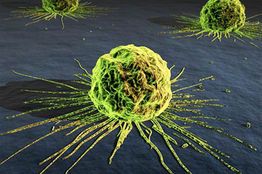
NIH finds gene variation that may shape bladder cancer treatment
Singapore: Research conducted at the National Cancer Institute (NCI) of the National Institutes of Health, highlighted that patients, who have inherited a specific common genetic variant, develop bladder cancer tumors that strongly express prostate stem cell antigen (PSCA), a protein which is also expressed in many pancreatic and prostate tumors. The study was published in the Journal of the National Cancer Institute on January 3, 2013.
In a previous study, the researchers identified a variant located in the PSCA gene on chromosome eight as associated with bladder cancer susceptibility. The gene determines whether the corresponding protein is expressed in bladder tumor tissue. In the latest report, they found that the 'T' nucleotide that comprises a gene variant called rs2294008 is a strong predictor of PSCA protein expression. The variant results in increased delivery of the protein to the cell surface, where it is involved in signaling and promotes tumor growth.
"We've been pursuing this mechanism for some time now. It started with our early results from the initial genome-wide association study that revealed a marker in the PSCA gene related to bladder cancer risk. This latest work reveals how a specific letter change in DNA influences protein expression at the cell surface. The big payoff is that a simple genetic test can determine which patients could benefit from anti-PSCA therapy," said Dr Ludmila Prokunina-Olsson of the NCI Division of Cancer Epidemiology and Genetics, who is also a senior author of the research.
"This is one of the first studies to show direct clinical implications of a genetic variant identified through genome-wide association studies for common cancers," said Dr Stephen J Chanock, acting co-director for the NCI Center for Cancer Genomics.
The scientists note that additional work is needed to develop alternative drugs targeting PSCA, and to evaluate drug delivery methods, such as systemic delivery for advanced muscle-invasive tumors and local, inter-bladder delivery in the case of non-muscle invasive tumors. Anti-PSCA therapy is likely to be effective only against tumors that express PSCA. A genetic test for the "T" nucleotide of this genetic variant can identify bladder cancer patients who could benefit from this treatment.




